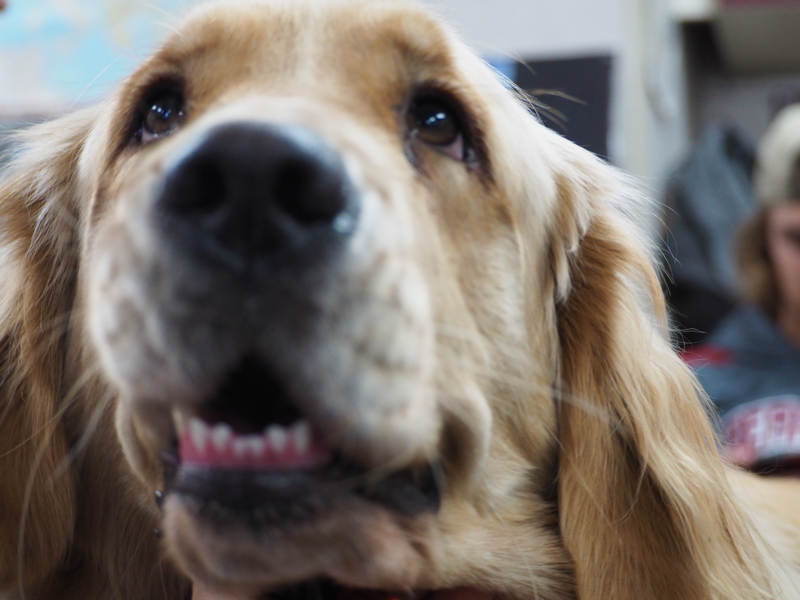Bear River is flush with furry friends, from the Guide Dogs in Training to staff pets, bringing a host of positive and negative side effects to our campus.
There are currently six Guide Dogs training at Bear River, and there have been other visits from at least three staff members’ dogs in recent months. According to School Psychologist Vicky Stanton, some students struggle with allergies to these animals, but having dogs on campus can also have positive effects on Bruins.
“Animal lovers find dogs to be reassuring and playful,” said Ms. Stanton. “They bring a sense of security and warmth to an environment. [However], for those who are not animal lovers, they can create fear and lack of security … another con is that there are some people who are allergic to them, and could have a serious physical reaction.”
In addition to affecting individual students, having staff pets on campus can also affect the Guide Dog (GD) program.
“If another pet dog that has been allowed on campus poops, and the owner doesn’t clean it up, and someone complains, the Guide Dog program is blamed automatically,” said sophomore Emily Telles, who is raising a Puppy-in-Training herself. “This puts the entire club at risk of being kicked off campus.”
“Pet dogs are something all GD puppies will have to learn to deal with, but I think it’s hard enough for the raisers and sitters to follow all the rules set up by GD and having to deal with outside dogs at school,” said Volunteer Leader Sue Perrone. “At GD, we want to set the puppies up for success, and the same goes for the raiser, and I think that having to encounter outside dogs at school is not helping.”
Due to these difficulties, the Guide-Dog-only rule schools typically have in place became more carefully enforced.
“There really is no ‘new’ policy,” said Vice Principal Cathy Peterson. “For whatever reason, people started taking advantage of the fact that the guide dogs were on campus, so they saw this as an opportunity to bring their own animals. Given Public Health and Safety regulations, it has never been okay to bring a ‘pet’ to work.”
One of the major effects of this decision was the new inability of long-time substitute and former teacher Jack McCrory to bring his dog, Bandit, to Bear River. Bandit was raised as a Guide Dog in Training, but was dropped from the program due to health issues. He was then adopted by Mr. McCrory, and has been accompanying the substitute teacher when he comes on campus ever since.
Mr. McCrory described how he thinks Bandit has benefited the GD program.
“I felt because of him, and because the kids liked him so much, it encouraged kids to enter the program,” Mr. McCrory said. “So I thought he was a good recruiter for the Guide Dogs for the Blind, because I’ve heard that from students.”
When the ‘new’ policy was made public, a petition was created online to ‘Bring Bandit Back to BR.’ The petition earned 501 signatures, and several students and parents left comments as to why they signed.
“I am signing this today because … Bandit is an amazing dog and a part of the Bruin Family,” said Bruin mom Angelee Humble. “Let’s show true Bruin Grit and keep Bandit where he is loved and adored.”
“Bandit has grown up and learned to be a service dog right alongside these students,” said fellow Bruin mom Breanne Mitchell. “I see no reason that he shouldn’t be allowed on campus to visit his students, just as Mr. McCrory is doing when he comes to sub.”
A student at Colorado State University, Macie Lazalier, offered a unique perspective on the situation.
“I am part of the family that raised Bandit,” she said. “He is an amazing dog, and a great attribute to Bear River.”
Ms. Peterson explained how certain dogs could be allowed to be at school.
“If an individual has a doctor’s note stating that, for health-related reasons, a person needs to be allowed to bring a certified service animal to work, then we work with that individual to allow this to happen,” said Ms. Peterson. “That being said, we do lay out parameters for such accommodations. This all goes through the district’s attorney, and we meet with the involved staff member.”
Telles said that she thought that Bandit should be registered as a therapy animal.
“I believe that Bandit should be certified as an official therapy dog, not only for McCrory, but for the students as well,” she said. “That way, he will be allowed on campus, as well as the Guide Dogs, but no ‘pet dogs’ are allowed.”
On November 19th, Bandit came on campus for the first time this school year, after having done just what this student suggested, and been registered as an emotional support animal.
“He’s just a great comfort dog, so I had to apply to the emotional support dogs, so that’s what I did,” Mr. McCrory said. “Because of that, I was allowed to bring the dog back in.”
Ms. Stanton explained her overall view of the situation.
“I am a dog lover, but my personal opinion is that, unless they are on campus for a specific purpose that has been cleared by administration, I think having them around is overall not a good idea,” she said. “The effect they have on individuals is undoubtedly positive, but allowing them on a school campus without restriction would be detrimental to the community.”
She went on to remind Bruins to consider all sides of the issue.
“This is a very sensitive topic, since animal lovers may feel personally rejected if they are not permitted to have their animals with them, and that is something we all must be aware of,” Ms. Stanton said. “On the other hand, people need to be understanding of different points of view than their own.”



































